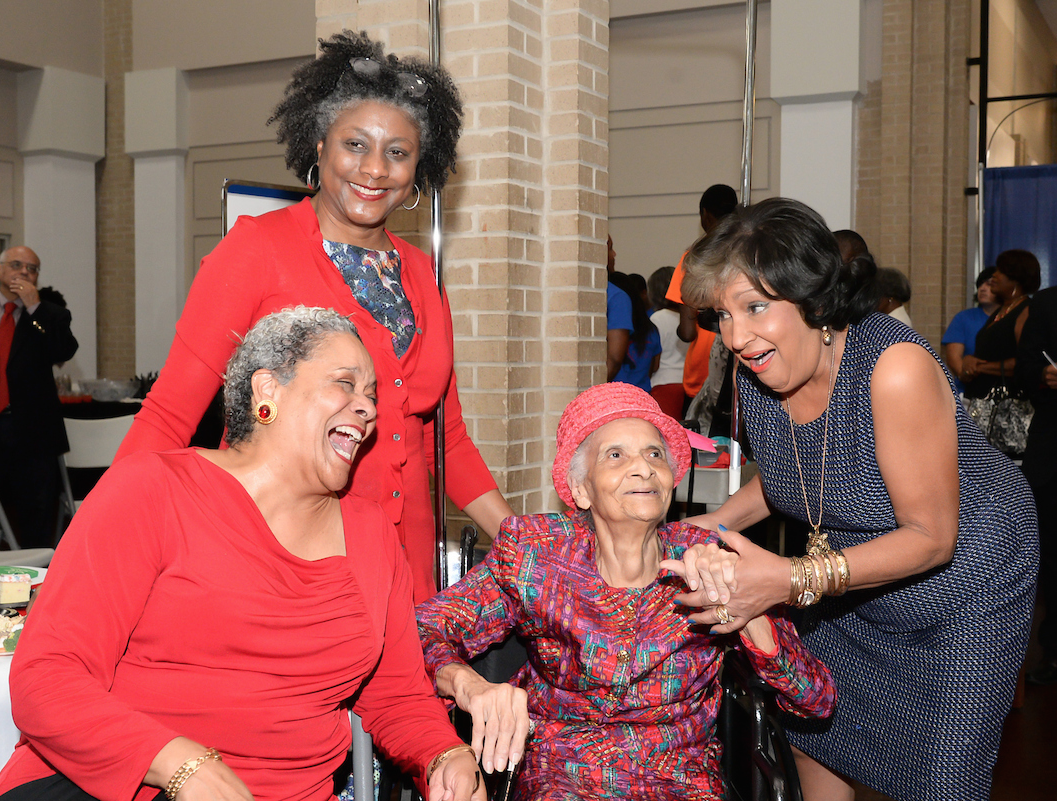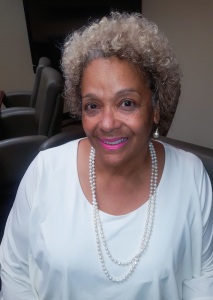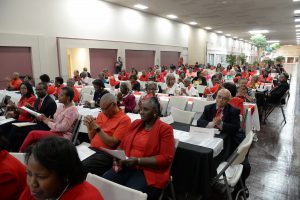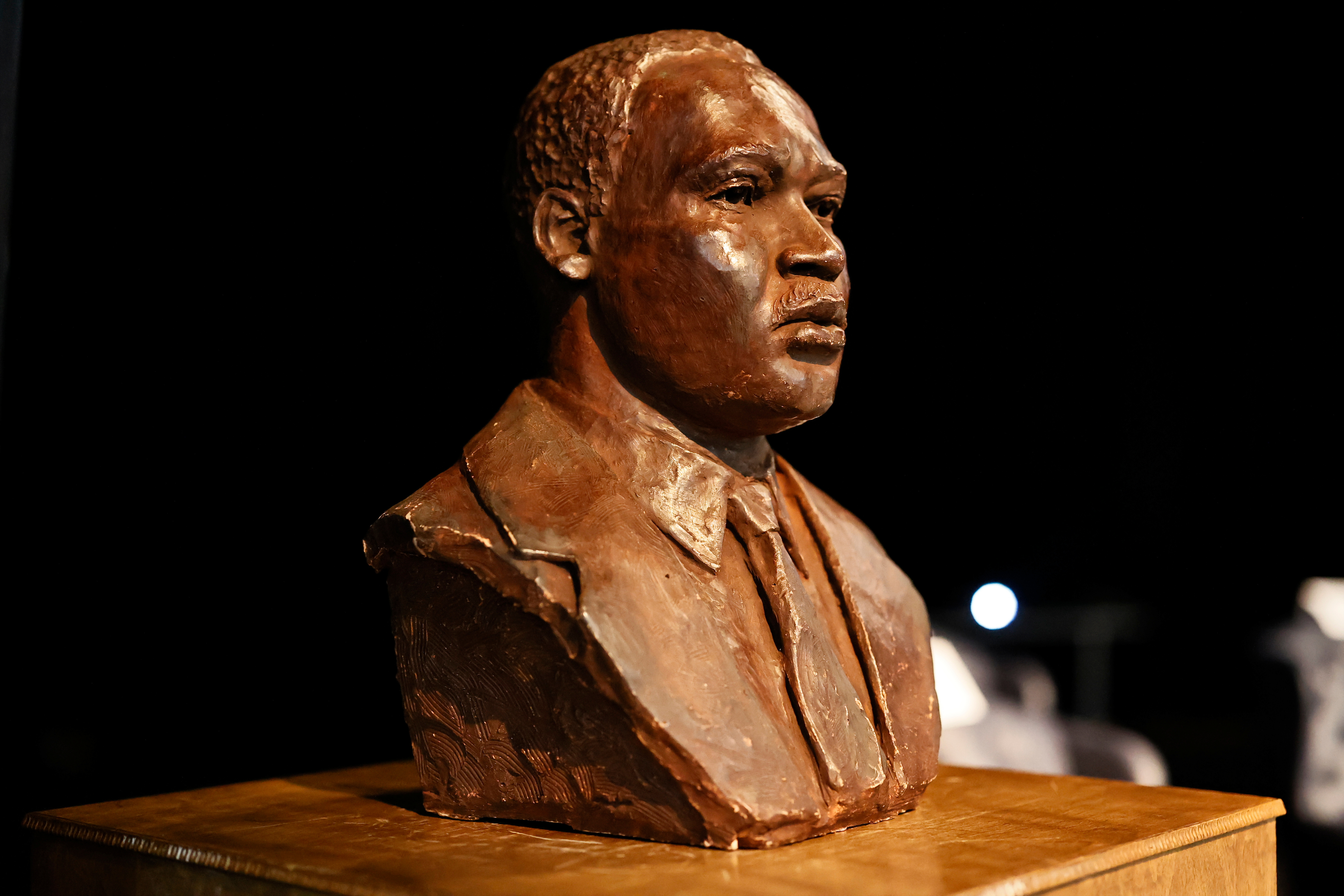
President Carolyn W. Meyers, far right, with a member of the JHS community (Photo by Charles A. Smith/JSU)
[hr]
![]()
[hr]
JSU’s Jackson Heart Study (JHS) Community Outreach Center (CORC) is celebrating 16 years of community engagement, recruitment and cardiovascular education from 8:30 to 11:30 a.m. on Sept. 24 at the Jackson Medical Mall – center stage.
“Happy birthday, sweet sixteen,” sings Dr. Donna Antoine-LaVigne, principal investigator for JHS CORC.
“Sixteen years shows that with a lot of work, a lot of effort, keeping the trust, doing what you say you’re going to do and keeping the community engaged – that you can sustain support for a good cause,” she said.
[dropcap]A[/dropcap]ccording to the National Heart, Lung, and Blood Institute, heart disease is the No. 1 cause of death among African-Americans. Hypertension, obesity and diabetes also disproportionately affect Blacks.
The Jackson Heart Study was formed to address these disparities and remains the largest single-site for investigation, prospective epidemiologic, observational investigation of cardiovascular disease among urban and rural-dwelling African-Americans ever undertaken.
JHS is a unique collaboration between Jackson State, The University of Mississippi Medical Center (UMMC), the National Institutes of Health, National Heart, Lung, and Blood Institute and Tougaloo College.

(Photo by Rachel James-Terry)
Antoine-LaVigne bore witness to the study’s infancy stages, having worked in the university’s community partnership outreach office, which existed under the umbrella of the coordinating center. For the first 13 years, JSU’s coordinating center was a hub for the study and responsible for all related contracts and data service.
“It was also the first coordinating center at an HBCU for a project of this magnitude. Jackson State built it from the ground up,” Antoine-LaVigne said.
In fall 2000, UMMC was tasked with recruiting for the JHS but had challenges mobilizing participants.
Staff members from JSU’s outreach office and coordinating center began doing a “boots on the ground” approach by going door to door, telling residents about the JHS.
“We could do all kinds of things, but if no one showed up and if no one cared, that would not have helped enrollment,” Antoine-LaVigne said.
As a result of Jackson State’s contemporary and strategic approach to recruitment, the study enrolled more than 5,000 African-American male and female participants ages 34-85 from Hinds, Rankin and Madison counties.
“So by engaging the community and reaching into the community, we were able to boost the numbers,” said Antoine-LaVigne, with a triumphant smile.
Now, in 2016, due to factors such as death and relocation, approximately 4,200 participants remain.
[dropcap]S[/dropcap]ince 2015, the JHS has aligned with Jackson State’s School of Public Health Initiative. It has also evolved into much more than a gauging instrument for the health influences and outcomes of African-Americans.
In 2013, the JHS Graduate Training and Education Center was established with principal investigator Dr. Marinelle Payton. The training center cultivates JSU and UMMC students in the art of public health, disease prevention and prolonging the lives of all people.
Antoine-LaVigne also touts the community health advisory network – composed of individuals indigenous to the tri-county area of Mississippi – as one of several major JHS derivatives. Networks have been established in Bolton, Canton, Clinton, Edwards, Jackson and Pearl.

CORC translates study results into layman’s terms for the advisory network and they, in turn, share the information with their friends, neighbors and church congregations.
Antoine-LaVigne is an acute believer in translating study results to the community because without defined interpretation of the findings there is little chance of positive change in the overall behavioral health of a specific group.
“Research for the sake of researching,” as described by Antoine-LaVagine, is research not shared with participants and is of benefit only to the researcher.
Giving an example of her thoughts, she references a lack of improvement in the health outcomes for certain groups in the Delta after a nearly 50-year ongoing health study.
“There is no translation. If you don’t translate what you find then, you’ve not helped the people… if we don’t know what to do, and it’s not shared with us in a language that we can understand then the numbers are going to stay the same,” said Antoine-LaVigne.
[dropcap]P[/dropcap]rincipal investigators, doctors and medical publications throughout the country, use research from the groundbreaking JHS.
Although the last participant examinations were concluded in January 2013, it takes time to gather, sort, review, write and distribute the findings. Nonetheless, the results alone will not instantaneously change behaviors.
“It doesn’t happen overnight. We know we need to be more physically active. We need to eat better, reduce our salt and fat intake. We need to increase our grains. There are things we know we need to do, but there are no real interventions to determine the long-term impact,” Antoine-LaVigne stated.
Dr. Pamela McCoy, senior program manager for the Jackson Heart Study, explains that a definitive time frame for behavior modifications is subjective due to the study’s dependability on such a wide-range of individuals with varied genetics, daily routines and general health.
 “When you conduct studies you do want to get what we call a baseline. As with the JHS – a longitudinal study, it follows people over time to determine what happens in the end. Hopefully, the end will be a lot better than the beginning,” McCoy said.
“When you conduct studies you do want to get what we call a baseline. As with the JHS – a longitudinal study, it follows people over time to determine what happens in the end. Hopefully, the end will be a lot better than the beginning,” McCoy said.
Looking ahead to the future of the JHS, Antoine-LaVigne and her counterparts would like to see more health-driven initiatives in areas most affected by certain diseases but admits that it would require more financial backing.
Antoine-LaVigne divulges, “Funding is pretty tight. It’s been challenging, but it’s also very rewarding to look at what we’ve done.”
Every year, the Jackson Heart Study has three major community-oriented events where they share information on study results.
One is Celebration of Life held the last Saturday in February. The second event, a Community Monitoring Board’s State of the Study, is where the director and principal investigator is expected to deliver a message regarding the study’s findings. It provides direction of the study and the intentions going forward.
Participants and members of the community are encouraged to give recommendations, suggestions or criticisms regarding the conduct of the study.
The third event, the birthday celebration, is a way for JHS to bring together and stay in contact with many of its participants and community folks.
This year’s speaker will be Dr. Alain Gerald Bertoni, a board-certified internist, epidemiologist and JHS investigator.
“They (participants) love coming to our events because they’re part of the community… They deserve to be informed. It’s their information… Without them, there would be no study,” said Antoine-LaVigne.






